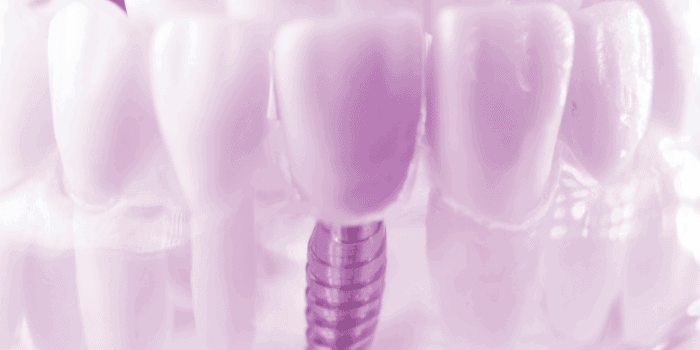If you’re preparing to have a tooth extracted, your dentist may recommend a dental implant as an option to replace the damaged tooth. Since dental implants do involve surgery, you may wonder how the process works and are tooth implants safe? We answer both questions and explain the benefits of going to an experienced oral surgeon below.
How safe are dental implants?
As with any surgical procedure, dental implant surgery does come with risks, however, complications are extremely rare. Oral surgeons have been performing the procedure for decades, and new technology and techniques have improved the viability of tooth implants and helped make dental implants safe for most people.
While very rare, the risks associated with dental implant procedures may include infection at the implant site, damage to surrounding teeth and blood vessels, nerve damage, and sinus issues resulting from an implant protruding into the sinus cavity. Patients who ask “are tooth implants safe?” should also know that when issues do occur, they are usually minor and easily treated.
Treatment by an experienced oral surgeon helps ensure the safety of dental implants
According to Dr. Laura Loftin, dentist Fort Worth, if you’re concerned is dental implant safe for you, it’s important to find an oral surgeon who specializes in the placement of dental implants. Dr. Loftin’s first concern is always for her patient’s safety, oral health and comfort, which is why she believes referring her patients out to an oral surgeon for dental implant surgery is the best option.
While she has undergone training to perform the procedure, Dr. Loftin believes her patients benefit from the fact that oral surgeons perform dental implant surgery multiple times a day—and thousands of times over their careers. As with any skill, the more times you perform the skill, the more adept you become at that skill. Experience equates to a safer experience for patients, and in the hands of an experienced oral surgeon, patients shouldn’t need to worry or question: Is dental implant safe?
“Due to their vast experience with implants, oral surgeons know the anatomy of the jaw inside and out, can identify when there is not enough bone available to support the implant on all sides and can recommend options like dental grafts when necessary. Having the implant placed by an oral surgeon (or a dentist appropriately trained with a long history of being successful at the procedure) is, in my opinion, the best way to go,” Dr. Loftin says.
If you’re wondering are teeth implants safe, you may also find it reassuring to know that oral surgeon’s offices are equipped with very specialized, high-level equipment that most general dentist’s offices don’t have onsite. With this technology, the oral surgeon can see things most general dentists don’t have the capability to see and get a much better view under the bone than a general dentist typically would be able to.
What is a dental implant?
A dental implant is a small titanium screw that the oral surgeon inserts into the jaw bone after the decayed tooth or teeth are removed. The screws come in different sizes, with screws for molars being larger than screws for front teeth. The titanium is compatible with the bone, and over a period of months, becomes more firmly integrated into the bone as the bone creates cells that attach the bone and screw together.
During this process, known as osseointegration, the jawbone ultimately unites with the titanium screw, with the screw acting as the root of the new artificial tooth. It’s critical to give the screw plenty of time to “become one with the bone” (about two to three months), as it helps create a solid structure to hold the implant in place. If the crown is placed over the screw too early, it could compromise the stability of the implant and cause it to fail.
What can I expect during a dental implant procedure?
The dental implant process involves a number of steps that take place over several months, with time allowed for healing between each step. Two experts—the dentist and oral surgeon—work closely together to help ensure the process goes smoothly, so you don’t have to worry: are implants safe?
The process all starts in the dentist’s office where the damaged or decayed tooth is removed. After healing from the extraction procedure, some patients will require a bone graft at the extraction site if the bone isn’t substantial enough to support an implant.
Once the graft has grown enough new bone to safely support the dental implant, which could take several months, the oral surgeon can proceed with inserting the implant (or screw) into the jaw. Again, it will take two to three months for the osseointegration process to take place. The oral surgeon will take X-rays to make sure the implant is fully integrated with the bone and able to support the implant for many years to come, if not life.
Next, the oral surgeon may perform another procedure to place an abutment (a small titanium disc or “washer”) on top of the screw. After approximately two weeks of healing the patient returns to their dentist to have an impression taken of their implant. The dentist sends that impression to the lab, along with instructions regarding the preferred color for the porcelain crown.
About a week later, the patient returns to the dentist’s office once again for the placement of the artificial tooth or crown. The dentist can either screw the crown on or cement the crown in place. Dr. Loftin typically recommends screwing the crown in place as the cement can become dislodged over time. Also, if the crown gets damaged, it’s easier to unscrew it and replace it with a new crown versus drilling the cemented crown off and replacing it.
Is the dental implant procedure painful?
If you’re concerned about pain during the procedure, don’t worry. The surgeon can provide local or general anesthesia to keep you comfortable. You can generally expect the typical discomfort that accompanies other dental procedures during each stage of the implant process.
For example, following the placement of the implant screw, patients may feel minor pain and discomfort for about 24 hours after the procedure, then feel fine. Your oral surgeon or dentist can prescribe pain medication and antibiotics if needed. Some patients also experience swollen gums, swelling and bruising of the gums and skin and minor bleeding. These symptoms usually resolve themselves within a day or two.
I’m missing a front tooth. Can I get a temporary crown over my implant?
Some patients who are missing a tooth or teeth in a noticeable spot—like their front teeth—may be embarrassed by their appearance. To help ensure the implant-bone integration is successful, Dr. Loftin cautions against the placement of a temporary crown but will create a retainer appliance for patients with an artificial tooth attached in the spot where the implant screw has been placed.
Similar to what some people refer to as a “flipper” or partial denture, this appliance has a wire and firm pink acrylic material that attaches to the roof of the mouth, much like a traditional retainer. Dr. Loftin can make these appliances for patients prior to their implant placement procedure, so they can insert the appliance right away.
What are the risks of not getting a dental implant?
When you lose a tooth or teeth, the surrounding teeth can become unstable, too. That’s because the bone at the site of the lost tooth can disintegrate quickly, meaning the bone density declines and the thickness of the jawbone lessens. Not only do the adjacent teeth no longer have a tooth nearby to support them, but the bone structure in the jaw also becomes compromised.
If you wait too long after an extraction to get your dental implant, then decide to proceed, you will probably need a bone graft to beef up the stability of the bone structure. Consequently, the risks of NOT getting a dental implant should outweigh the fears of is tooth implant safe.
Do you have questions about implants or are you wondering “are teeth implants safe?”
If you live near Fort Worth, Dr. Laura Loftin, dentist Fort Worth, is here to help. She can assess your oral health and explain all of the options for replacing missing teeth, so you can decide which option makes the most sense for you. Should you decide dental implants are the route to go, Dr. Loftin can refer you to a trusted oral surgeon and help you take steps to prepare for the procedure.
To schedule an appointment at Dr. Laura Loftin’s practice of family and cosmetic dentistry Fort Worth TX, please call our office at (817) 429-4444.


